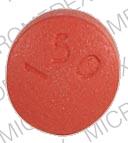Rifapentine
Generic name: rifapentine [ RIF-a-PEN-teen ]
Brand name: Priftin
Dosage form: oral tablet (150 mg)
Drug class: Rifamycin derivatives
What is rifapentine?
Rifapentine is an antibiotic that fights bacteria.
Rifapentine is used together with other medicines to treat active tuberculosis (TB) in adults and children who are at least 12 years old.
Rifapentine is also used to keep inactive (latent) TB from becoming active in adults and children who are at least 2 years old.
Rifapentine must always be used in combination with other tuberculosis medications.
Rifapentine may also be used for purposes not listed in this medication guide.
Rifapentine side effects
Get emergency medical help if you have any of these signs of an allergic reaction: hives; difficult breathing; swelling of your face, lips, tongue, or throat.
Rifapentine may cause serious side effects. Call your doctor at once if you have:
-
diarrhea that is watery or bloody;
-
liver problems--nausea, upper stomach pain, itching, tired feeling, loss of appetite, dark urine, clay-colored stools, jaundice (yellowing of the skin or eyes);
-
low red blood cells (anemia)--pale skin, feeling light-headed or short of breath, rapid heart rate, trouble concentrating; or
-
low white blood cell counts--fever, swollen gums, painful mouth sores, pain when swallowing, skin sores, cold or flu symptoms, cough, trouble breathing.
Rifapentine can cause changes in the color of your skin or body fluids. You may notice a red-orange appearance of your skin, tears, sweat, saliva, urine, or stools. Your teeth, tongue, or the inside of your mouth may also appear red-orange. This discoloration can permanently stain contact lenses or dentures.
Common side effects of rifapentine may include:
-
nausea, vomiting, diarrhea, loss of appetite;
-
flu symptoms;
-
headache, joint pain;
-
itching or rash;
-
eye redness; or
-
abnormal liver function tests.
This is not a complete list of side effects and others may occur. Call your doctor for medical advice about side effects. You may report side effects to FDA at 1-800-FDA-1088.
Related/similar drugs
Warnings
Follow all directions on your medicine label and package. Tell each of your healthcare providers about all your medical conditions, allergies, and all medicines you use.
Before taking this medicine
You should not take rifapentine if you are allergic to rifapentine, rifabutin (Mycobutin), or rifampin (Rifadin, Rifater, Rimactane, Rifamate).
To make sure rifapentine is safe for you, tell your doctor if you have:
-
porphyria (a genetic enzyme disorder that causes symptoms affecting the skin or nervous system);
-
HIV or AIDS;
-
if you have used rifampin or isoniazid in the past and they were not effective in treating TB; or
-
if you have been exposed to someone with TB that could not be treated with rifampin or isoniazid.
FDA pregnancy category C. It is not known whether rifapentine will harm an unborn baby. Tell your doctor if you are pregnant or plan to become pregnant while using this medicine.
Rifapentine can make birth control pills less effective. Ask your doctor about using non hormonal birth control (condom, diaphragm with spermicide) to prevent pregnancy while taking rifapentine.
It is not known whether rifapentine passes into breast milk or if it could harm a nursing baby. You should not breast-feed while using this medicine. Rifapentine may cause a red-orange discoloration of breast milk.
Do not give this medicine to a child without medical advice.
How should I take rifapentine?
Follow all directions on your prescription label. Do not take this medicine in larger or smaller amounts or for longer than recommended.
Take with food.
To make swallowing easier, you may crush the rifapentine tablet and sprinkle the medicine into a spoonful of pudding, applesauce, or other soft food. Swallow this mixture right away. Do not save the mixture for later use.
Use this medicine for the full prescribed length of time. Your TB may get better and then come back if you do not take rifapentine as directed. Skipping doses may also increase your risk of further infection that is resistant to antibiotics. Rifapentine will not treat a viral infection such as the flu or a common cold.
Call your doctor if your symptoms do not improve, or if they get worse while using rifapentine.
Store at room temperature away from moisture and heat.
What happens if I miss a dose?
Take the missed dose as soon as you remember. Skip the missed dose if it is almost time for your next scheduled dose. Do not take extra medicine to make up the missed dose.
What happens if I overdose?
Seek emergency medical attention or call the Poison Help line at 1-800-222-1222.
What should I avoid while taking rifapentine?
Antibiotic medicines can cause diarrhea, which may be a sign of a new infection. If you have diarrhea that is watery or bloody, stop using rifapentine and call your doctor. Do not use anti-diarrhea medicine unless your doctor tells you to.
What other drugs will affect rifapentine?
Many drugs can interact with rifapentine, including prescription and over-the-counter medicines, vitamins, and herbal products. Tell each of your health care providers about all medicines you use now and any medicine you start or stop using.
More about rifapentine
- Check interactions
- Compare alternatives
- Side effects
- Dosage information
- During pregnancy
- Drug class: rifamycin derivatives
- Breastfeeding
- En español
Patient resources
Other brands
Professional resources
Other brands
Related treatment guides
Further information
Remember, keep this and all other medicines out of the reach of children, never share your medicines with others, and use this medication only for the indication prescribed.
Always consult your healthcare provider to ensure the information displayed on this page applies to your personal circumstances.
Copyright 1996-2025 Cerner Multum, Inc. Version: 3.01.

